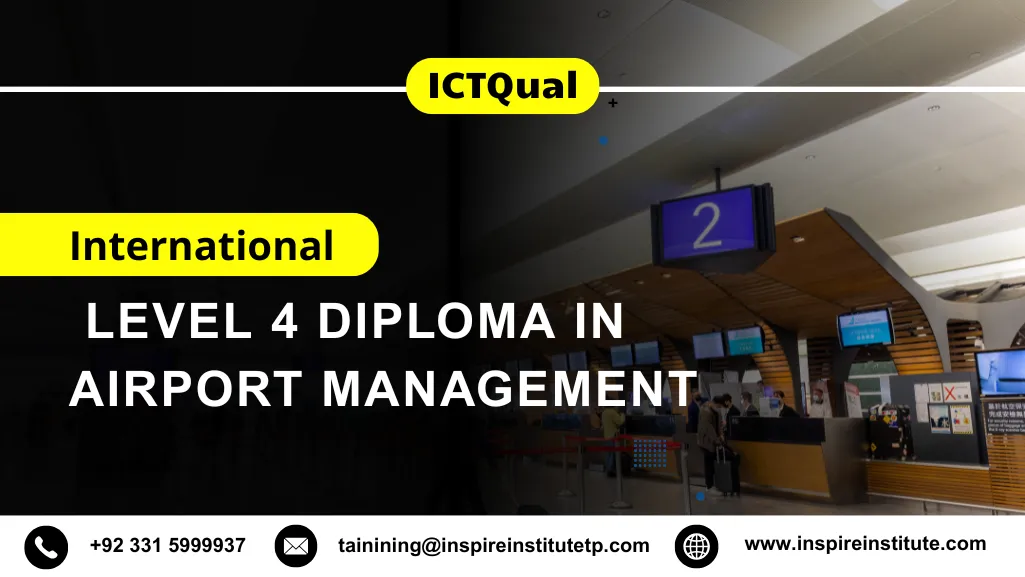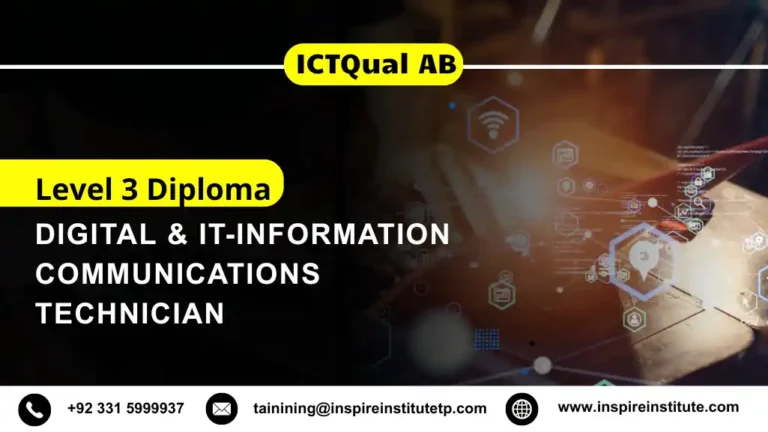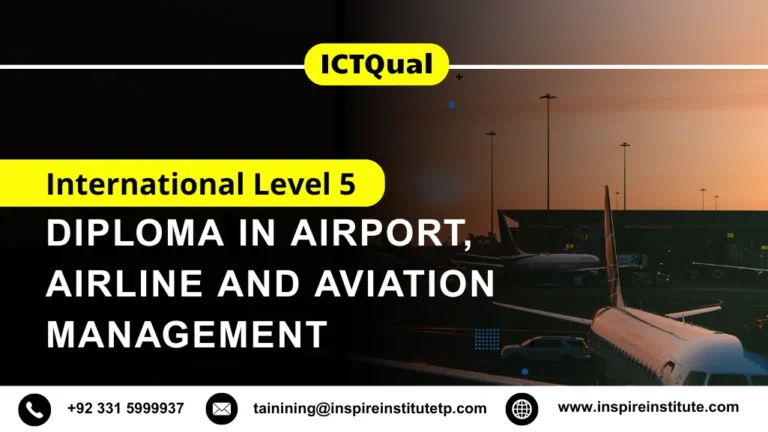ICTQual International Level 4 Diploma in Airport Management
The ICTQual International Level 4 Diploma in Airport Management is a globally recognized qualification designed for individuals aspiring to build a successful career in the aviation industry. This program provides a strong foundation in airport operations, safety management, customer service, and regulatory compliance, equipping learners with the knowledge and skills required to thrive in one of the world’s most dynamic sectors.
Airports today are complex hubs that demand highly skilled professionals to ensure smooth operations, passenger satisfaction, and adherence to international standards. This diploma addresses those needs by combining practical training with theoretical insights, preparing learners for supervisory and managerial roles in airport environments. From understanding aviation law and security protocols to mastering airport planning, logistics, and airline relations, the course delivers comprehensive coverage of essential competencies.
One of the key strengths of the ICTQual Level 4 Diploma is its international recognition, making it an ideal choice for learners seeking global career opportunities. Graduates can pursue roles such as Airport Duty Manager, Operations Supervisor, or Airline Liaison Officer, or progress to higher qualifications in aviation and transport management. The program is also designed with flexibility in mind, offering pathways for both working professionals and full‑time students.
By completing this qualification, learners not only gain a respected credential but also position themselves at the forefront of an industry that continues to expand worldwide. The ICTQual International Level 4 Diploma in Airport Management is more than a course—it is a gateway to leadership in global aviation.
Why Choose this Qualification
The ICTQual International Level 4 Diploma in Airport Management is designed to prepare learners for leadership roles in the aviation industry. With its global recognition and industry‑aligned curriculum, this qualification provides the knowledge, skills, and credibility needed to succeed in airport operations and management.
Globally Recognized Diploma
- Internationally respected qualification valued by airports and airlines worldwide
- Enhances employability across multiple regions and aviation markets
- Aligns with global aviation standards, ensuring credibility
- Provides a competitive edge in international job applications
- Recognized by employers, training bodies, and higher education institutions
- Strengthens professional profiles on a global scale
Career‑Focused Learning
- Prepares learners for supervisory and managerial roles in aviation
- Directly linked to real‑world airport operations and challenges
- Builds leadership and decision‑making skills for high‑pressure environments
- Equips learners for roles such as Airport Duty Manager or Operations Supervisor
- Focuses on practical application, not just theory
- Bridges the gap between entry‑level roles and management positions
Comprehensive Curriculum
- Covers airport operations, safety, and security management
- Includes aviation law, compliance, and regulatory frameworks
- Focuses on customer service excellence and passenger experience
- Provides insights into logistics, planning, and airline relations
- Balances theoretical knowledge with practical case studies
- Ensures learners gain a 360‑degree understanding of airport management
Industry‑Aligned Standards
- Developed in line with ICAO and IATA guidelines
- Reflects current global aviation practices and benchmarks
- Ensures graduates meet international employer expectations
- Provides training relevant to both developed and emerging aviation markets
- Keeps learners updated with evolving industry regulations
- Strengthens compliance and safety knowledge critical to aviation careers
Flexible Study Options
- Designed for both working professionals and full‑time students
- Offers adaptable learning pathways to suit different schedules
- Provides opportunities for online or blended learning delivery
- Supports learners balancing education with career or personal commitments
- Accessible to international learners regardless of location
- Encourages self‑paced study while maintaining structured guidance
Clear Progression Routes
- Provides a pathway to higher diplomas and degree‑level programs
- Supports academic progression in aviation and transport management
- Builds a foundation for specialized aviation leadership qualifications
- Enhances eligibility for postgraduate study in related fields
- Strengthens long‑term career development plans
- Offers recognition of prior learning for advanced entry in some programs
International Career Opportunities
- Opens doors to employment in airports, airlines, and aviation authorities
- Provides mobility across global aviation hubs and regions
- Equips learners for roles in passenger, cargo, and operations management
- Increases chances of securing leadership positions abroad
- Builds a professional profile suited for international aviation careers
- Expands opportunities in both private and public aviation sectors
Course Overview
UK based Qualification
Study Units: 6 Units
Evidence & Assignment Based
Course Level: Level 4
Qualification Structure
This qualification, the ICTQual International Level 4 Diploma in Airport Management, consists of 6 mandatory units.
- Airport Business Environment and Global Trends
- Airport Operations and Terminal Management
- Aviation Safety Management Systems (SMS)
- Airside Operations and Ramp Management
- Aviation Law, Policies, and International Standards
- Human Factors and Resource Management in Airport Operations
Who Should Take This Course
The ICTQual International Level 4 Diploma in Airport Management is designed for individuals who want to build, strengthen, or transition into a career in aviation. Whether you are just starting out, already working in the industry, or seeking international opportunities, this qualification provides the knowledge and recognition needed to progress confidently in airport management.
Aspiring Aviation Professionals
- Individuals new to aviation who want to establish a strong foundation in airport operations and management.
- Learners seeking an entry‑level qualification that opens doors to global aviation careers.
- Those motivated to gain industry‑recognized skills before applying for airport or airline roles.
Current Airport and Airline Staff
- Ground staff, customer service agents, or operations assistants aiming for supervisory positions.
- Employees who want to formalize their experience with an internationally recognized qualification.
- Staff seeking to expand their knowledge of compliance, safety, and customer service excellence.
Aviation and Transport Managers in Training
- Professionals preparing for leadership roles in airport environments.
- Individuals who need structured training in decision‑making, compliance, and operational efficiency.
- Learners who want to strengthen their management skills for higher‑level responsibilities.
Career Changers Entering Aviation
- Professionals from other industries looking to transition into aviation management.
- Individuals seeking a globally recognized qualification to support a career shift.
- Those who want practical and theoretical knowledge to confidently enter the aviation sector.
Students Seeking Academic Progression
- Learners who have completed lower‑level aviation, business, or management qualifications.
- Students aiming to progress to advanced diplomas or degree‑level programs in aviation.
- Individuals who want to build a clear academic and professional pathway in aviation management.
International Learners and Global Career Seekers
- Candidates who want a qualification recognized across multiple regions and aviation markets.
- Learners aiming for mobility and career opportunities in international airports and airlines.
- Those who want to align their skills with ICAO and IATA global aviation standards.
Professionals Seeking Industry‑Relevant Skills
- Individuals who want to strengthen expertise in airport systems, safety management, and regulatory frameworks.
- Learners focused on enhancing customer service and passenger experience knowledge.
- Professionals aiming to stay updated with evolving aviation industry practices.
Course Benefits
The ICTQual International Level 4 Diploma in Airport Management offers learners a wide range of professional, academic, and personal benefits. It is designed to enhance employability, strengthen industry knowledge, and provide a globally recognized qualification that supports long‑term career growth in aviation.
Globally Recognized Qualification
- Earn a diploma respected by airports, airlines, and aviation authorities worldwide.
- Gain credibility that enhances your professional profile in international markets.
- Increase your chances of securing roles in both domestic and global aviation hubs.
- Align your career with international aviation standards and benchmarks.
- Build a qualification that is portable across regions and industries.
Enhanced Career Opportunities
- Open pathways to supervisory and managerial roles in airport operations.
- Qualify for positions such as Airport Duty Manager, Operations Supervisor, or Airline Liaison Officer.
- Strengthen your CV with a credential that employers actively seek.
- Improve your chances of promotion within your current organization.
- Access opportunities in both passenger and cargo management sectors.
Comprehensive Skill Development
- Gain expertise in airport operations, safety, and compliance.
- Develop strong leadership and decision‑making skills.
- Learn to manage customer service excellence and passenger experience.
- Understand aviation law, logistics, and regulatory frameworks.
- Build practical knowledge through case studies and real‑world applications.
Industry‑Aligned Curriculum
- Study content designed in line with ICAO and IATA global standards.
- Acquire skills that match current industry requirements and practices.
- Stay updated with evolving aviation regulations and compliance needs.
- Learn competencies that are directly transferable to the workplace.
- Ensure your training is relevant to both developed and emerging aviation markets.
Flexible Learning Pathways
- Suitable for both working professionals and full‑time students.
- Offers adaptable study modes to fit around personal and professional commitments.
- Provides opportunities for online or blended learning delivery.
- Encourages self‑paced study while maintaining structured guidance.
- Accessible to learners across different regions and time zones.
Academic and Professional Progression
- Provides a clear pathway to higher diplomas and degree‑level programs.
- Supports long‑term academic growth in aviation and transport management.
- Enhances eligibility for postgraduate study in related fields.
- Builds a foundation for specialized aviation leadership qualifications.
- Strengthens career development plans with recognized progression routes.
Global Mobility and Networking
- Expand your career opportunities across international airports and airlines.
- Build connections with peers and professionals in the aviation sector.
- Gain exposure to global best practices in airport management.
- Position yourself for roles in both public and private aviation organizations.
- Enhance your adaptability for careers in diverse cultural and operational contexts.
Eligibility Criteria:
Age: Learners must be 18 years of age or older at the time of enrolment.
This ensures maturity and readiness for supervisory‑level study in aviation management.
Educational Background:A Level 3 qualification (such as A‑Levels, Intermediate, or an equivalent diploma) is typically required.
Learners with substantial professional experience in the aviation industry may also be considered based on prior learning and practical expertise.
Work Experience:The diploma is suitable for school leavers, career starters, and individuals transitioning into aviation.
Any experience in hospitality, customer service, or logistics can be beneficial but is not mandatory.
English Language Proficiency:
Learners are expected to demonstrate a good command of the English language, as all course materials, discussions, and assessments are conducted in English. Competence in reading, writing, listening, and speaking is required to ensure effective participation. Centres may conduct an English proficiency assessment or interview where necessary..
Other Requirements: Learners must have access to a computer or digital device with a stable internet connection if engaging in online or blended learning. They should also demonstrate a keen interest in aviation management, customer service, and operational leadership. A commitment to professional development and ethical workplace behaviour is essential for success in this qualification.
Future Progression
Completing the ICTQual International Level 4 Diploma in Airport Management provides learners with a strong platform for both career advancement and further professional development. This qualification is designed to open doors to higher‑level diplomas, industry certifications, and leadership roles within the aviation sector.
Progression to Higher Diplomas
- Advance to ICTQual Level 5 Diploma in Aviation or Airport Management.
- Deepen knowledge in strategic airport operations and leadership.
- Strengthen eligibility for mid‑management and senior supervisory roles.
- Gain advanced expertise in compliance, safety, and international regulations.
- Build a pathway toward specialized aviation management qualifications.
Professional Career Advancement
- Qualify for supervisory and managerial positions in airport operations.
- Pursue roles such as Airport Duty Manager, Operations Supervisor, or Airline Liaison Officer.
- Enhance promotion prospects within current employment.
- Transition from entry‑level to mid‑level aviation management roles.
- Increase competitiveness in both domestic and international job markets.
Specialized Aviation Certifications
- Progress to IATA or ICAO certifications for niche expertise.
- Gain specialist skills in areas such as air cargo, ground handling, or aviation safety.
- Combine the diploma with technical training for career diversification.
- Strengthen professional credibility with globally recognized certifications.
- Position yourself as a multi‑skilled aviation professional.
Industry‑Relevant Skill Development
- Continue building expertise in airport systems and passenger service.
- Stay updated with evolving aviation regulations and compliance standards.
- Develop advanced leadership and decision‑making capabilities.
- Gain exposure to international best practices in airport management.
- Enhance adaptability for diverse aviation environments.
International Career Opportunities
- Leverage the diploma’s global recognition to work in airports worldwide.
- Access opportunities in passenger services, cargo operations, and compliance.
- Pursue roles in both public and private aviation organizations.
- Gain mobility across international aviation hubs and regions.
- Build a career aligned with ICAO and IATA global standards.






